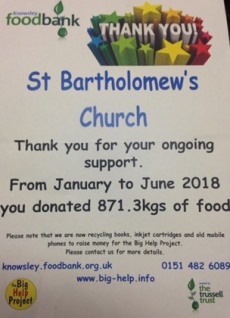Case Study 1: St Bartholomew, Roby
 What are the passions of those in your congregation? Encouraging social action ‘champions’ at St Bartholomew’s, Roby
What are the passions of those in your congregation? Encouraging social action ‘champions’ at St Bartholomew’s, Roby
St Bartholomew’s, Roby, one of the larger churches in the diocese, has a wide range of activities that parishioners described as social action. For example, their toddler group, which has been running for 32 years, aims to teach younger children and their carers about Jesus and also to provide a meeting place for parents, grandparents and childminders to help prevent social isolation.
Similarly, a bi-monthly Lunch Club provides a low-cost meal and a place of fellowship for those from the wider community. Many of the activities at St Bartholomew’s have been initiated, supported and sustained through formal church structures. However, they have also found that social action is not always instigated within the walls of the church; it may develop through the passions and callings of individual parishioners who become ‘champions’ for specific causes.
Five years ago, recently two retired parishioners started to ask God to show them a charity they could serve. Stumbling across those doing a food bank collection at their local supermarket they felt prompted to find out more. Their passion and sense that God has called his Church to feed the poor led them, with permission from their vicar, to address the Sunday congregations and begin weekly collections for Foodbank. Because of their commitment and continued efforts to regularly raise awareness amongst congregation members, St Bartholomew’s donated over a tonne of food last year to Foodbank.
Through articles in the church magazine and posters around the church building, congregation members also regularly hear about SHARe: an organisation that supports asylum seekers and refugees in Knowsley. St Bartholomew’s connection with SHARe has developed through one parishioner’s growing involvement in the organisation – he now sees himself as a ‘rep’ for the charity within the church and has run sessions as part of a lent course to begin to explore how the church can engage with refugees in their community.
What can church leaders learn from this case study? It is valuable to consider how you can release congregation members to listen to God and follow their particular passions. Then, allow regular space in Sunday services/at PCC meetings for individuals to raise awareness and educate others about these causes.
Case Study 2 St Mary's Wavertree
“It wasn’t intended to be a job club, it was just a drop-in place”: St Mary’s, Wavertree responding to the needs of the local community
Lilyfield began 7 years ago: the local community centre had recently closed and the curate at the time noticed that the people who went there now had nowhere to go. She offered the church building as a drop-in space for people to gather. From there Lilyfield has grown.
At the heart of Lilyfield’s development has been St Mary’s desire to respond to the needs of their local community, and work in partnership with other local organisations. As people started to come to the drop-in morning, clergy and volunteers heard that many were struggling with the jobcentre – cutbacks meant that staff no longer had as much time to offer personal support for people looking to find jobs. Some parishioners had recently retired; they had both the time and skills to be able to support people with job searches.
Matching skills with need, St Mary’s developed a relationship with a local jobcentre and began the Lilyfield Job Club, providing both computers and support for those looking for work. Now meeting weekly, Lilyfield also hosts a free café, with homemade cakes and sofas for people to sit and chat, and a Keep Fit class is run by an outside organisation that use the church building. It has also become a hub for local services – hosting monthly drop-in sessions with local councillors and providing a space for community police officers to engage with the community.
For some, Lilyfield has become more than just a place to find a job, keep fit or have a cuppa. It is a space where they belong and can gently explore questions of faith through conversations and offers of prayer with the Christian volunteers. Some Lilyfield regulars have become volunteers themselves or have started to engage with other activities offered within the wider church community.
With further closures to local community buildings, such as a community day centre for those with additional needs, St Mary’s has continued to adapt – now providing a weekly Local History Group, in partnership with health and wellbeing charity Imagine, which particularly caters for those with additional needs. Last month a new group started: Natter. This is a group for the over 60s, with the aim to combat isolation and loneliness – particularly for those who are grieving after the loss of a partner. Church leaders hope that in time, as elements of spirituality are gradually introduced, this may develop into a new congregation.
What advice would they offer other churches looking to engage in social action projects?
“Don’t be afraid to try different things: some things will work, and some things may not work, it’s still worth trying them. And even if you’ve only got a small group of volunteers, try and link up with other local groups. Maybe link up with your local councillor, see what the need is in your community and how you can respond to it in a small way.”
Case Study 3 St Stephen's Hightown
 Unexpected beginnings: social action evolving out of fundraising
Unexpected beginnings: social action evolving out of fundraising
“How can we raise money to repair our church porch?” In 2013 this was the main question on the minds of St Stephen’s PCC. It led to two initiatives: a Thursday craft group to produce products to be sold at the church coffee mornings, and the formation of a social committee to host fundraising events.
Five years later the church porch has long since been repaired and these initiatives are flourishing. 18 people regularly attend the weekly craft group which often produces dolls’ clothes, baby blankets and tea cosies. The social committee hosts monthly events which include an annual Ladies Day, garden parties, quiz nights, the ‘Sherry, Soup and Simple dessert’ evening in the winter and a New Year’s Eve party that was attended by 80 people from Hightown last year. But as they have evolved, these initiatives have become about more than fundraising for the church.
Parishioners running the craft group now see it as an important form of social action - reaching out to, in particular, the elderly community in Hightown who may be lonely and isolated. The group has welcomed those who would not normally enter the building and showed them it is not the dark and serious place they may remember from their childhood. Friendships have been formed and, through encountering the parishioners who run the sessions, those who attend now know a Christian they could speak with in times of trouble.
Similarly, the social activities have brought the church into the heart of the Hightown community, with events becoming a focal point for those would may not previously have got out in the winter months. Fundraising is still an important element of the events, but the church is no longer the sole benefactor.
Demonstrating the generosity of Christ, funds are now often raised for local causes, with the group now having a new mission: to bring people together and bless the community of Hightown.
What advice would they offer other churches looking to engage in social action projects?
“The church hall might be your first step into church… it’s got to be a welcoming place as much as the church.”
And for those looking to set up a social committee:
“brainstorm a few ideas…be proactive in asking people to be involved…and have a bit of fun with fundraising along the way.”
Case Study 4 St Barnabas and St Francis Wigan
“I want to go to church”: How a drop-in led to a new Sunday congregation
In 2014, observing social isolation, addiction and geographical struggles (such as people carrying heavy bags on the 20-minute walk back from their nearest food bank), St Barnabas and St Francis felt prompted to do something to help. Working in partnership with local organisations, they developed a drop-in gathering, opening the church each weekday from 2.30-4 pm. Run by volunteers from the churches, the drop-in has become a space where people are welcomed and accepted, can have a coffee and a conversation or engage with the other partnership organisations, such as Addaction or a local women’s group who regularly attend. Previously hosting a food bank, the drop-in is now the site of a ‘food outlet’ where members can access high-quality food that would otherwise have been wasted, for a low cost.
Since February 2018, a new Sunday congregation has emerged from these drop-in afternoons. Its evolution has been slow, responding to the desires of those using the service. A year before, the congregation started running a daily prayer time before the food outlet opened. This included a ‘breaking of the bread’ gathering two times a week. Slowly word spread, and people would arrive early and ask to be prayed for. Congregation members prayed for them but also encouraged and supported them to pray themselves. Conversations continued into the drop-in afternoons and some began to ask if they could come to church. From these questions and through listening to those asking them, a new worshipping community emerged. It started in the church hall but those attending began to ask, ‘When can we go to church?’, so it quickly moved into the church itself. At this time, church leaders felt it was not appropriate to fully integrate the new and existing congregations. Instead, 10-15 adults, plus children, now gather each Sunday afternoon for an informal, participatory service. Looking ahead, there are hopes that those attending will over time lead the service themselves.
What advice would they offer other churches looking to engage in social action projects, which may potentially lead to new worshipping communities?
“If God’s put it on your heart, do it.” “Don’t be discouraged by people saying: ‘it’s just social work’.” Partner with local organisations; don’t wait to have everything you need in place. Then listen and respond to those who attend.
#BiggerChurch
#BiggerDifference
#DoTenThings